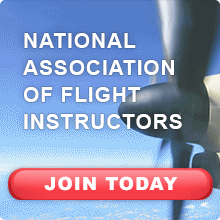Helping New CFIs
| From NAFI's Chair |
Helping New CFIsI happened upon a column this week in the Nebraska Department of Transportation's PIREPS electronic October/November 2018 newsletter. The article was written by Lee Svobada, a well-respected designated examiner in the Omaha area and can be found here. It was entitled "Delinquent Items" and was a brief listing of the things he has found missing in logbooks and records, be they the applicant's or the aircraft's. In full disclosure, I once sent him a candidate for a single-engine commercial add-on and forgot the endorsement that certified the candidate had received and logged training time from me in the previous two calendar months. That was an embarrassing lesson learned. Some of items Svoboda passes on in his article are things like an aircraft missing placards, student pilot certificates not having been signed, the applicant checking the wrong class of aircraft (although I'm not sure how that can happen in IACRA) and the CFI has not signed off on the application and so on. Larry Bothe, writing in NAFI's Mentor magazine has made many similar, if not the same points. |







